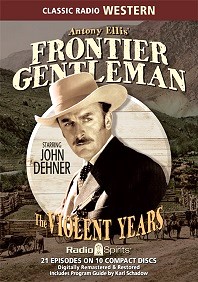
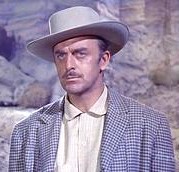 Frontier Gentleman (February 2, 1958–November 16, 1958) aired “The Last of Belle Siddons” on September 7, 1958 as the 31st of the classy, well produced, but short-lived series’ 41 episodes.
Frontier Gentleman (February 2, 1958–November 16, 1958) aired “The Last of Belle Siddons” on September 7, 1958 as the 31st of the classy, well produced, but short-lived series’ 41 episodes.
(This is the last of four episodes featuring Belle Siddons. We showcased the first episode, “Madame Belle Siddons, Confederate Spy” (aka “The Gambling Lady”) here. Two weeks ago we ran the second in the story-arc, “Belle Siddons’, Encore” here. We ran the third episode, “Belle Siddons Strikes Back,” last week here, and this week we run the concluding episode of the Belle Siddons’ stories.)
Since there are always those coming for the first time to any individual episode of any program showcased here from week to week, below is the general background, the overview, of the program, at the end of which there will be a few specific comments on this episode of Frontier Gentleman.
The brief duration of this quality western (10 months) had more to do with the fact that by 1958 television had become the dominant entertainment venue in America, and this new medium was already into reruns of any number of TV westerns. Frontier Gentleman, while not groundbreaking as was Gunsmoke (on radio and TV, for instance), and while exhibiting a novel approach of its own when it came to character over action in most cases, still could not break through the glass ceiling—or glass television screen—and last longer than it did.
Speaking of the novel approach the series took in portraying the western, its protagonist was of a different stripe altogether. This so-called frontier gentleman was an Englishman. His name was J. B. Kendall and he had spent most of his career as a British Cavalry officer in the Punjab region of Northwest India/Eastern Pakistan. He accepts a position as a correspondent for The London Times to travel to the Wyoming and Montana territories of the still-forming United States in the post-Civil War 1870s. His mandate is to report first-hand what he sees and learns of this still untamed land, with its warring Indian tribes, sometimes successful, often-times failing bouts of exploration, colonization, and pretty much still lawless time in the young country.
The inestimable TV, film, and radio actor John Dehner (1915-1992, photo top right) would win the role of J. B. Kendall and he played it to perfection, even answering the question as to why his British accent seemed almost unnoticeable. Dehner’s distinctive voice was one of his recognizable calling cards across his numerous radio appearances, placing him in the top rank of favorite radio voices along with those of Orson Welles, William Conrad, and Frank Lovejoy. Non-plussed when this top-notch western series was cancelled, Dehner was hard at work on another western series within a week, none other than Have Gun—Will Travel, as the well-educated but tough gun-for-hire, Paladin. For more on Dehner’s background, of which I found numerous items of interest, click on the Have Gun—Will Travel link above. John Dehner died in 1992 of complications from emphysema and diabetes.
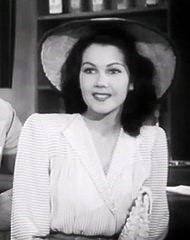 Jeanne Bates (1918-2007) would play Madame Belle Siddons in a four-story arc beginning with this episode, and would finish the arc in episodes 29, 30, and 31. Bates had a remarkable career in radio, TV, and film. Among some of her notable roles were (in no order): Murder Will Out & Gunsmoke (radio), Peter Gunn, Sky King, The Lone Ranger, 3 appearances on Perry Mason in 1960, Ben Casey, and Rawhide (all on TV), and a few notable films she appeared in were The Strangler (1964), Suppose They Gave a War and Nobody Came (1970), Eraserhead (1977), and of the four films near the end of her career she had small parts in, two were Die Hard 2 (1990), and Mulholland Drive (2001). Jeanne Bates died of breast cancer in 2007.
Jeanne Bates (1918-2007) would play Madame Belle Siddons in a four-story arc beginning with this episode, and would finish the arc in episodes 29, 30, and 31. Bates had a remarkable career in radio, TV, and film. Among some of her notable roles were (in no order): Murder Will Out & Gunsmoke (radio), Peter Gunn, Sky King, The Lone Ranger, 3 appearances on Perry Mason in 1960, Ben Casey, and Rawhide (all on TV), and a few notable films she appeared in were The Strangler (1964), Suppose They Gave a War and Nobody Came (1970), Eraserhead (1977), and of the four films near the end of her career she had small parts in, two were Die Hard 2 (1990), and Mulholland Drive (2001). Jeanne Bates died of breast cancer in 2007.
Noted radio scripter Antony Ellis (1920-1967) was born English but became a naturalized American citizen. He capped his unbridled fascination for the American Old West by writing each episode of Frontier Gentleman. They were noted for their historical accuracy and depth of character development within the half-hour time restriction. He and series star John Dehner were good friends in real life. Antony was married to Georgia Ellis (1917-1988), who starred as Kitty in radio’s Gunsmoke.
Future award-winning film composer Jerry Goldsmith (1929-2004) would be responsible for the show’s musical theme. Of his many film scores, a few of the more recognizable would include Alien (1970), L. A. Confidential (1997), Patton (1970), The Sand Pebbles (1966), The Wind and the Lion (1975), Chinatown (1974), Planet of the Apes (1968), Logan’s Run (1976), Star Trek: The Motion Picture (1979), and The Lost World: Jurassic Park (1997). From his wiki page, “Over the course of his career, Goldsmith received 18 total Academy Award nominations, making him one of the most nominated composers in the history of the Awards. Despite this, Goldsmith won only one Oscar, his score for The Omen (1976). This makes Goldsmith the most nominated composer to have won an Oscar only on one occasion.” Jerry Goldsmith died of colon cancer in 2004.
To recap the previous Belle Siddons’ episodes, she was a confederate spy during the Civil War, but now, after the war and as many on both sides have done, she tries to reconstruct her life and reinvent herself in order to survive. She travels the country with her gambling operation, making enough money to support herself (and more than a little extra) and now finds herself in Deadwood, Dakota Territory, where she has befriended J. B. Kendall, the English reporter for The London Times, sent to the young United States of America to report first-hand about the goings on in this often rough and lawless new country. Episodes 2 and 3 focus on an old flame of Belle’s now turned outlaw, Archie McLaughlin. News has come to Deadwood that McLaughlin’s gang is preparing to attack a gold shipment, and Deadwood’s sheriff is questioning Belle because of her past relationship with McLaughlin. She truthfully pleads ignorance of the planned robbery, but the sheriff is still understandably leary of her ignorance of the robbery and of McLaughlin. The robbery takes place but not without resistance and one of McLaughlin’s gang is killed, another badly wounded. The wounded robber is secretly brought to Belle who attempts to care for him. Meanwhile, the rest of McLaughlin’s gang escapes with the gold and the sheriff once again tries to pump Belle for information about its whereabouts. Through other means, the sheriff learns where the gang may be heading and sets off (with Kendall) to capture or kill McLaughlin and recover the loot. This episode tells the story of that chase, but not without a twist. Belle secretly hires another lawman to go after her former lover, afraid the original sheriff is too bloodthirsty and wouldn’t hesitate to kill McLaughlin instead of trying to take him alive should he track down the remainder of the gang. So we have a shot-up gang on the run, two lawmen after the gang not knowing of the existence of the other (and Kendall along as a reporter in this dangerous enterprise). Of course, little goes as planned when the gang is found, and in the final resolution there is only one winner. It’s an exciting episode, fraught with gunplay and scheming, and a fitting closure to the 4-episode Belle Siddons story. As always, the writing, production values, and acting are top shelf, enhancing listening pleasure immeasurably.
(The linked CD at the top includes all 4 Belle Siddons episodes.)
Play Time: 24:38
{This episode of Frontier Gentleman aired on a Sunday, which meant that the neighborhood gang—barely back to school from summer vacation a week—would meet at the corner newsstand to pick the newest issues of their favorite reading material. Astounding SF (1930-present, now Analog) was a long-standing favorite, with stories by such top names as Christopher Anvil, Gordon R. Dickson, and James H. Schmitz, not to mention Part 2 of 2 of Poul Anderson’s We Have Fed Our Sea (book title The Enemy Stars). ASF was a monthly in 1958. The Magazine of Fantasy & Science Fiction offered (among other treats) two superior stories for its September 1958 issue: Part 2 of 3 of Robert A. Heinlein’s now classic juvenile novel Have Spacesuit Will Travel, and Robert Bloch’s now also classic story “That Hell-Bound Train.” F&SF was also a monthly in 1958. And not to be outdone, Galaxy‘s September 1958 issue featured (among others) stories by Isaac Asimov, Lloyd Biggle, Jr., Damon Knight, and Arthur C. Clarke. As was the case with ASF and F&SF, Galaxy was a monthly in 1958.}
[Left: Astounding SF, 9.58 – Center: F&SF, 9/58 – Right: Galaxy, 9/58]
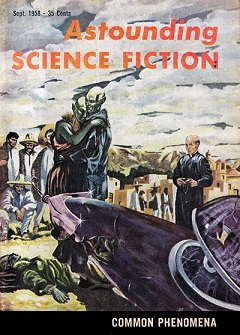
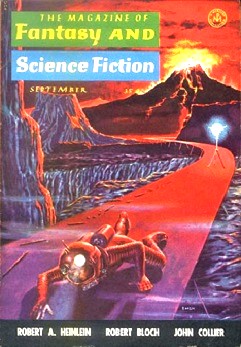
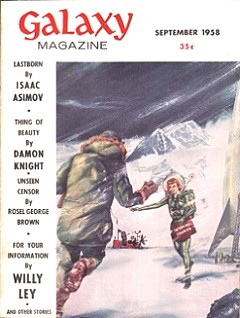
To view the entire list of weekly Old Time Radio episodes at Tangent Online, click here.